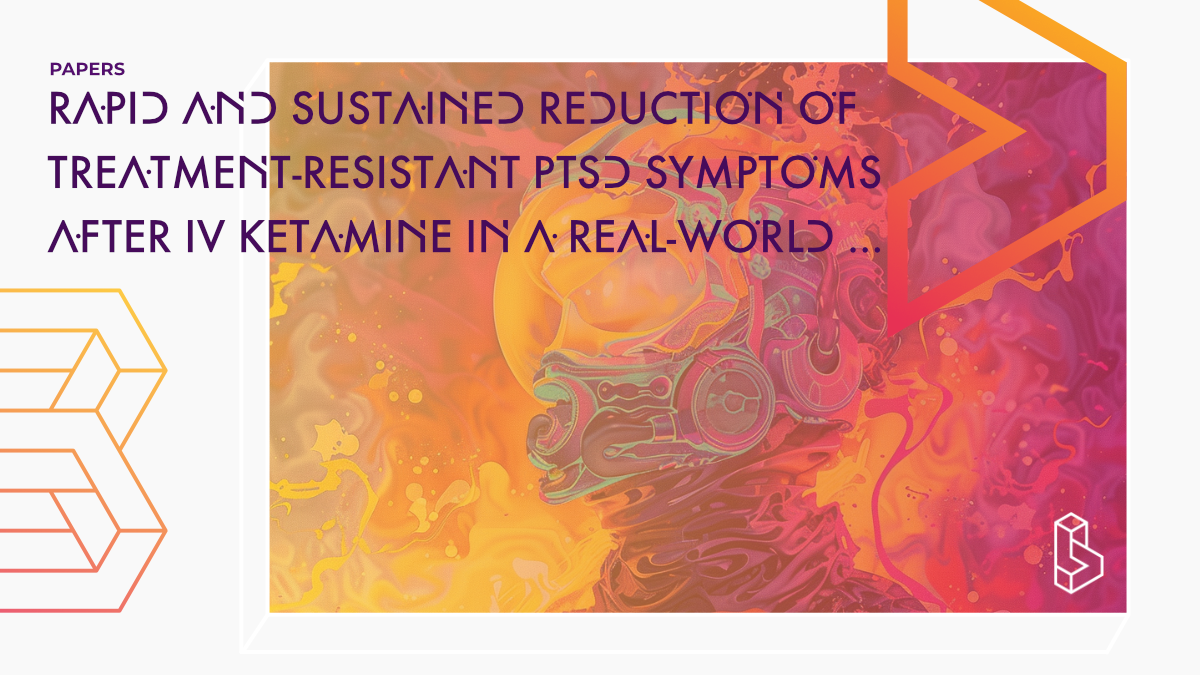This pre-print open-label trial (n=117) administered intravenous ketamine in highly supportive environments to outpatients with elevated PTSD symptoms. The protocol included preparatory, integration, sensory immersion, and psychotherapy sessions, resulting in significant reductions in PTSD symptoms.
Abstract of Rapid and sustained reduction of treatment-resistant PTSD symptoms after intravenous ketamine in a real-world, psychedelic paradigm
“Background: Traditional treatments for Post-Traumatic Stress Disorder (PTSD) often show limited success with high dropout. Ketamine, an N-methyl-D-aspartate antagonist known for rapid antidepressant effects, has decreased PTSD symptoms in some studies but not others.mAdministering ketamine in ways that parallel psychedelic-assisted treatments—including preparatory, integration, sensory immersion, and psychotherapy sessions—could decrease PTSD symptoms meaningfully.
Methods: A sample of 117 screened outpatients with elevated scores on the PTSD Checklist for DSM-5 (PCL-5) received intravenous ketamine in highly supportive environments. The protocol included sessions focusing on preparation, setting intentions, and integration for each of at least six administrations. Administration sessions included eye shades and evocative music in ways that paralleled facets of MDMA trials for PTSD.
Results: Mean PCL scores decreased from 52.39 (SD = 11.90) to 29.42 (SD = 16.52; Cohen’s d = 1.60). Patients tolerated treatment well, with no serious adverse events. Covariates, including age, gender, days between PCL assessments, number of psychiatric medications, and suicidal ideation were not significant moderators; concomitant psychotherapy did reach significance, d = 0.42.
Conclusion: Intravenous ketamine in supportive environments, with hallmarks of psychedelic therapy, preceded large reductions in PTSD symptoms. These results highlight ketamine’s potential when delivered in this manner, suggesting that environmental factors might account for some of the variation that has appeared in previous work. Given the molecule’s cost, minimal interaction with other psychiatric medications, and legal status, intravenous ketamine in a psychedelic paradigm may be a promising new option for PTSD that has not responded to other treatments.”
Authors: Henry A. MacConnel, Mitchell Earleywine & Steven Radowitz
Summary of Rapid and sustained reduction of treatment-resistant PTSD symptoms after intravenous ketamine in a real-world, psychedelic paradigm
Introduction
PTSD is a debilitating mental health condition that affects approximately 1 in 4 individuals exposed to trauma. It has far-reaching impacts on families, communities, and healthcare systems.
While certain mental health conditions commonly resolve without treatment, only 44% of PTSD cases self-resolve after a mean of 40 months. The conventional treatments for PTSD primarily include cognitive-behavioral interventions and pharmacotherapy.
Find this paper
https://doi.org/10.31234/osf.io/78m96
Open Access | Google Scholar | Backup | 🕊
Cite this paper (APA)
MacConnel, H. A., Earleywine, M., & Radowitz, S. (2024). Rapid and sustained reduction of treatment-resistant PTSD symptoms after intravenous ketamine in a real-world, psychedelic paradigm. https://doi.org/10.31234/osf.io/78m96

